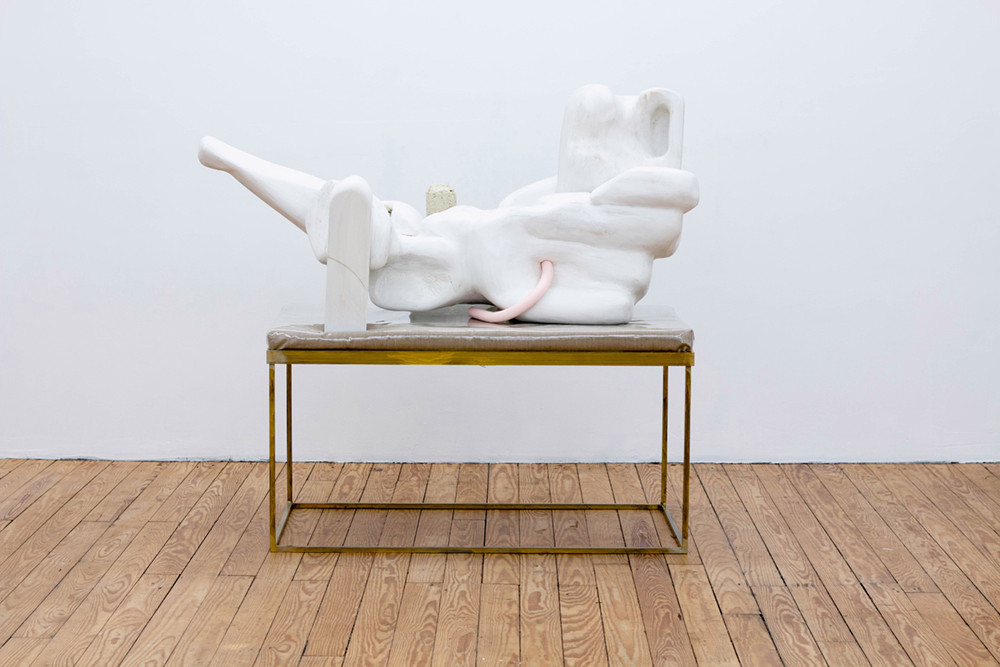[ad_1]
Douglas Rieger’s sculptures imply the human figure but aren’t exactly figurative. In his exhibition “Funny Business,” three large, free-standing assemblages composed of carved, oiled wood augmented with silicone, steel, vinyl, concrete, and upholstery foam sat at the center of the gallery, surrounded by smaller sculptures on triangular concrete shelves mounted on the walls. The sheen of the wood suggested that of sweat on skin, while chunks of pockmarked concrete appeared curiously flabby, evoking cellulite-dimpled thighs. Although adopting anthropomorphized postures, Rieger’s configurations of taut planes and rippling, muscular curves take considerable liberties with human anatomy. When the singularity comes and machines attempt to pass as humans, they will probably look a lot like these sculptures.
The exhibition text describes the artist as a “finish fetishist,” and there’s a rewarding attention to surface in the works, particularly in the deft seaming and interplay between different wood grains. A handful of pieces have a distressed, almost shabby chic wash of plaster, like a body covered in dust at the end of a long workday. Meanwhile, utilitarian fasteners and fixings—gaskets, rubber bands, cabinet hardware—provide a libidinal charge. In a small untitled example (2019), a knob extends straight up from a pelvic form at a right angle, as if suffering from priapism. Others, like Love (2019), a white-painted object reclining on a bench and raising a leglike limb into the air, have lengths of floppy pink silicone tubing emerging from various orifices. Encountering the sculptures, I imagined a creation narrative in which a godlike figure hands out sex organs like Oprah gives away cars.
Rieger, with his irreverent humor and carpentry skills, has inevitably been compared to H.C. Westermann. But unlike Westermann, whose work overtly critiqued midcentury American militarism and hyper-consumption, Rieger adopts a more intimate perspective that is often shot through with queer longing. This is most evident in Querelle (2017)—titled after the 1982 film by Rainer Werner Fassbinder, whose protagonist alternates between acts of criminal violence and gay sex—which resembles nothing so much as the teapot from Disney’s Beauty and the Beast if it were into light bondage, its phallic spout held in a taut loop of black string.
Rieger’s works aren’t apolitical, but his critiques play out at the scale of the body. In Grand Poohbah (2019), the most beguiling sculpture in “Funny Business,” a wooden form loosely suggesting a head or torso rests on a geometric base of white boxes punctuated with mechanical cutouts, the combination evoking a vivisected cyborg. This was the least resolved sculpture in the show, lacking the confidence and polish of most of the works on view, but it hints at a theme found throughout the exhibition. The most remarkable aspect of Rieger’s sculptures is how sharply they invoke the conditions of labor under whatever stage of capitalism we’ve arrived at today. His forms appear tired in the manner of people. One pictures them arriving home grateful to be able to take off their bras, as evoked in a small untitled sculpture (2019) consisting of an impossibly hunched soft-bellied torso with drooping breasts. Imagine looking at a sculpture and worrying that it can’t afford health insurance to get treatment for its aching back—it’s business as usual, but there’s nothing funny about that.
[ad_2]
Source link


